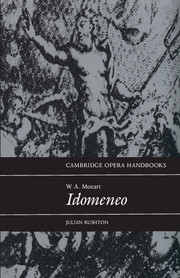Book contents
- Frontmatter
- Contents
- List of illustrations
- General preface
- Acknowledgements
- Introdution
- 1 Synopsis
- 2 Genesis of an operone
- 3 ‘Madame Dorothea Wendling is arcicontentissima’: the performers of Idomeneo
- 4 The genre of Idomeneo
- 5 From myth to libretto
- 6 Idomeneo after Mozart
- 7 General structure of Idomeneo
- 8 Two soliloquies
- 9 The musical language of Idomeneo
- 10 Tonality and motive
- 11 Elettra's first aria and the storm scene
- 12 Conclusions
- Notes
- Select bibliography
- Index
- Plate section
5 - From myth to libretto
Published online by Cambridge University Press: 05 June 2012
- Frontmatter
- Contents
- List of illustrations
- General preface
- Acknowledgements
- Introdution
- 1 Synopsis
- 2 Genesis of an operone
- 3 ‘Madame Dorothea Wendling is arcicontentissima’: the performers of Idomeneo
- 4 The genre of Idomeneo
- 5 From myth to libretto
- 6 Idomeneo after Mozart
- 7 General structure of Idomeneo
- 8 Two soliloquies
- 9 The musical language of Idomeneo
- 10 Tonality and motive
- 11 Elettra's first aria and the storm scene
- 12 Conclusions
- Notes
- Select bibliography
- Index
- Plate section
Summary
The story of Idomeneus is scantily represented in mythology and literature. Its comparative popularity in the eighteenth century may have something to do with a desire vicariously to stage the story of Jephtha, at a time when biblical subjects were generally banned from the theatre. Jephtha's daughter, like Idamante (and, in a far more widely known Greek tale, Iphigenia), is willing to die at her father's hand:
And Jephtha vowed a vow unto the Lord, and said, If thou shalt without fail deliver the children of Ammon into mine hands, Then it shall be that whatsoever cometh forth of the doors of my house to meet me, when I return in peace from the children of Ammon, shall surely be the Lord's, and I will offer it up as a burnt offering … behold, his daughter came out to meet him with timbrels and with dances; and she was his only child; And it came to pass, when he saw her, that he rent his clothes, and said, Alas, my daughter! thou hast brought me very low, and thou art one of them that trouble me: for I have opened my mouth unto the Lord, and I cannot go back. And she said unto him: My father, if thou hast opened thy mouth unto the Lord, do to me according to that which hath proceeded out of thy mouth; forasmuch as the Lord hath taken vengeance for thee of thine enemies, even the children of Ammon.
In the earliest versions of the Jephtha, Idomeneus, and Agamemnon stories the sacrifice is consummated.
- Type
- Chapter
- Information
- W. A. Mozart: Idomeneo , pp. 69 - 82Publisher: Cambridge University PressPrint publication year: 1993
- 1
- Cited by



